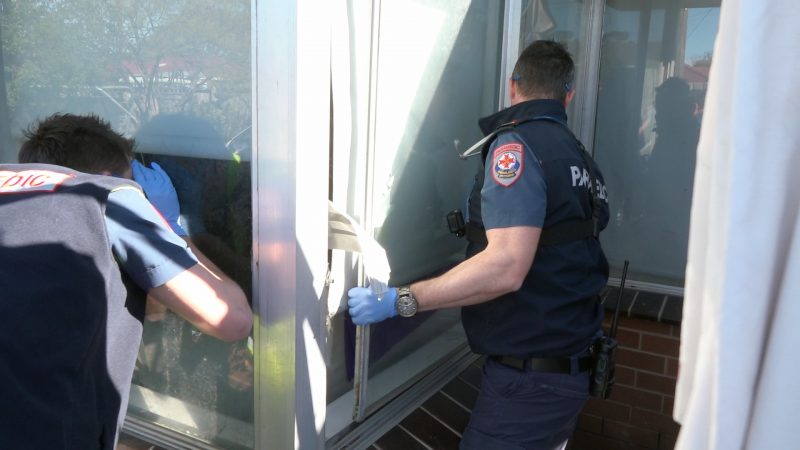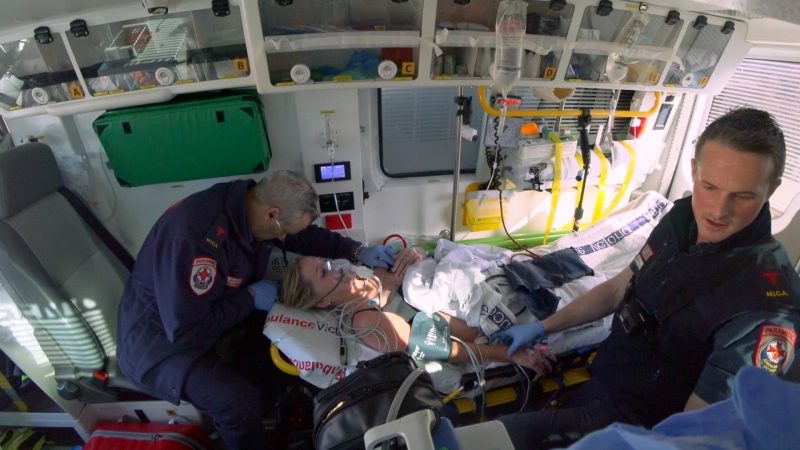How a life-threatening allergic reaction can happen so fast
November 23, 2018in News, Paramedics TV
Keysborough mother-of-three Shauna was busy doing jobs at home when she took a common antibiotic to treat a painful abscess.
“It all happened so quickly,” she said. “This overwhelming feeling of dread came over me, I felt tingly, hot, nauseous. I just knew I needed to call an ambulance.”
Shauna’s gripping tale of a life-threatening allergic reaction plays out on the latest episode of Paramedics (Channel 9, Thursdays at 8.30pm) where shortly after calling Triple Zero (000) she passes out and paramedics struggle to gain access to her home.

Paramedics struggle to gain access to Shauna’s home after she suffers a life-threatening allergic reaction.
The 41-year old knew she was allergic to penicillin but had never suffered a reaction as serious as this before.
Last year, Ambulance Victoria received 11,000 calls for allergic reactions. Anaphylaxis is the most serious allergic reaction and is a medical emergency. Within minutes of exposure to the allergen, or ‘trigger’, a person can suffer potentially life-threatening symptoms such as facial swelling, breathing difficulties and unconsciousness.
On the way to the scene, MICA paramedic Mark says, “The main concern for me would be that she’s got airway swelling, which is immediately life-threatening.”
On arrival, Mark and fellow paramedics peer through the window and spot Shauna on her couch, losing consciousness. Working quickly to find a way into the property, they manage to gain access through a window to reach Shauna.
“A case of anaphylaxis as serious as Shauna’s requires a continuous dose of adrenalin via an infusion,” says Mark on the show.
After Shauna’s condition improved, she was transported to hospital where she spent the night in ICU, with her worried daughters, Kelly (18) and Ebony (21) by her side.
Shauna is a full-time carer to her elder son Troy, who has disability, and has expressed how grateful she is to be back home with her family able to resume her important caring role.
“I’m normally the last to call an ambulance or seek medical treatment for myself – it’s always for others. But this time I just knew that it wasn’t good – and I can’t even put into words how glad I am that I called,” Shauna said.
“Shauna’s call to Triple Zero has saved her life,” says MICA paramedic Mark on the show.

At 41 years of age, this was Shauna’s first episode of anaphylactic shock.
Common triggers for anaphylaxis include:
- food – common allergy-causing foods include crustaceans, tree nuts, eggs and dairy
- insect venom – particularly bees, jumper ants, ticks, fire ants and wasps
- some medicines – including prescription drugs like penicillin.
Anaphylaxis can occur within minutes – the average is around 20 minutes after exposure to the allergen. Symptoms may be mild at first, but tend to get worse rapidly.
Unfortunately there is no cure for anaphylaxis. The most important management strategy is to avoid all known triggers and to always carry your adrenaline auto-injector (AAI) – commonly known in Australia as EpiPen and AnaPen.
Now knowing she is at risk of anaphylaxis, Shauna now carries two EpiPens wherever she goes.
Visit the Better Health Channel for more information on anaphylaxis causes, symptoms and treatment.
Catch-up on episodes of Paramedics on 9Now.

